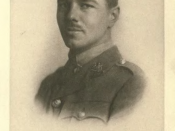These are the comments that my professor made on my first draft: "In many ways this is an outstanding paper. Your explication is thorough and insightful. Here and there you choose a word that isn't perfect; here and there your phrasing could be improved; but overall, you communicate your understanding clearly to the reader."
I made the appropriate changes and submitted the following paper:
Dulce et Decorum Est - Explication
Many writers and critics have often commented that Wilfred Owen is one of the best poets of the 20th Century (Criticism). Many of his poems and letters showed, with great description, his point of view regarding the brutalities war. It is his experience in the war that inspired much of his work. "Dulce Et Decorum Est" is an example of the kinds of poems that show the horrors that Owen experienced and opposed.
If one only reads the title, then the first thing that comes to mind is that this is a poem of glory and patriotism.
The words "Dulce et Decorum Est" mean "it is sweet and fitting" (Owen). These words are from a Latin saying taken from an ode by Horace. These words were widely used during the start of World War I to inspire patriotism and the concept of duty to country (Wilfred). The complete saying is "Dulce et decorum est pro patria mori." This is also how this poem ends. Translated, it says, "it is sweet and fitting to die for your country" (Wilfred). The main purpose of this saying was to let the men know that there was great glory and honor to die for one's country.
It is only after reading the rest of the poem that one can see that the title is meant to be sarcastic. There is nothing sweet...


